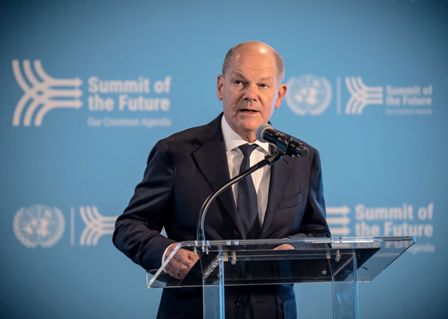By Franziska Spiecker, dpa I Wednesday, October 09, 2024
BERLIN – The new acting general secretary of Germany’s governing Social Democrats (SPD), Matthias Miersch, has urged his party to stick more closely to its own priorities to make it stand out from its coalition partners and the opposition, with general elections less than a year away.
Miersch was appointed the SPD acting general secretary on Monday, after his predecessor Kevin Kühnert unexpectedly resigned for health reasons.
The SPD, also the party of Chancellor Olaf Scholz, is in coalition with the Greens and the pro-business Free Democrats (FDP), but the centre-left alliance has been plagued by in-fighting and rumours that it is unlikely to survive until the polls in September 2025 come up time and again.
“I am under the impression that we have been the ones who have held this coalition together in many places in recent years,” Miersch told Germany’s Deutschlandfunk radio on Wednesday.
“We also need to show time and again what our priorities and successes are in this government.”
Looking ahead to the coming months, Miersch said it was important for the SPD to position itself programmatically in a way that “clearly” differentiates it from the opposition Christian Democrats (CDU).
“A state that is capable of acting and does not abandon the individual when it comes to care, when it comes to good daycare facilities, when it comes to infrastructure” was central to him, said Miersch. The experienced left-leaning politician also said he would be putting a special focus on the issue of solidarity in the coming months.
“This society must stick together and those who have more must also show more solidarity so that this country can actually get through hard times in solidarity with each other,” said Miersch.
Miersch, who will serve as the SPD’s general secretary until a party conference next year, takes over at a time when the SPD is grappling with some of its worst results in regional elections since World War II.
The party won only 6.1% in parliamentary elections in the eastern state of Thuringia last month, which also saw the anti-immigrant Alternative for Germany (AfD) party win its first ever regional election, the first state-level victory for a far-right party since 1945.
The SPD barely did any better in regional elections held in the neighbouring state of Saxony on the same day, while a win in the eastern state of Brandenburg in late September was attributed to the popularity of incumbent state premier Dietmar Woidke.
Polling at national level suggests that support for the SPD, traditionally one of the two biggest mainstream parties in Germany besides the CDU, is low too just a year before national elections.
A survey by pollsters Forsa from October 1 puts the party at 17%, compared to 31% for the CDU and its Bavarian sister party, the CSU, and at the same level nationally as the AfD.


